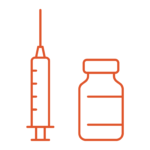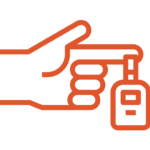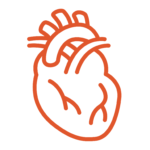Center for Diabetes, Obesity, and Cardiovascular Diseases
We are partners with our patients and their families to collaboratively, properly, and effectively manage weight, diabetes, and cardiovascular diseases through therapy and education.
Starting one of our programs is easy!

Call us at 0117555000 to schedule your examination and to enroll in one of our programs: Diabetes Program / Obesity Program. Initially, we will schedule a visit to perform all necessary blood analyses so that your results are ready for the first visit.

During your first visit, we will review your medical history, examine previously conducted blood tests, and carry out cardiological, endocrinological, and dietary specialist examinations. If necessary, we will also perform an abdominal ultrasound focusing on the pancreas. Please bring all prior medical documentation you have to avoid unnecessary tests. Plan to spend 90 minutes with us during the first visit to complete all necessary analyses and examinations and to better get to know you.

Our team of doctors will enroll you in the obesity/diabetes program. You will receive all necessary instructions and therapy for a month, as well as a diet plan. Our team will educate you on how to self-administer the therapy (simply, injections in the stomach) and how to follow all program instructions for effective results. The conclusion of the program is in agreement with the endocrinologist when all goals and maximum program results have been achieved.

Through a collaborative and partnership approach, we will monitor your progress and results. The diabetes program has its first check-up two months after joining the program, while the Obesity Program requires a monthly check-up throughout the duration of the program. You will receive therapy for each subsequent month after a check-up at our center. If the program plan is not fulfilled for some unjustified reasons (patient does not follow instructions, patient does not come for check-ups), the results will not be complete, and therapy will be discontinued.

You can pay for the programs with credit cards, by invoice, or cash at Puls Cardiological Center. You pay the amount of the program you are enrolled in one-time during the first visit, and controls are subsequently paid for after each scheduled and performed check-up.
Our joint fight against diseases caused by lifestyle and their associated conditions begins at PULS CARDIOLOGICAL CENTER – a center for diabetes, obesity, and cardiovascular diseases staffed by endocrinologists, cardiologists, dietitians, radiologists. This center expertly manages all processes of weight loss, diabetes control, and cares for the overall health of patients through examinations, controls, and state-of-the-art methods for diabetes, weight loss, and the diagnosis, treatment, and prevention of cardiovascular diseases.
Diabetes, obesity, and cardiovascular diseases are among the greatest health challenges we face this century. Our Center for Diabetes, Obesity, and Cardiovascular Diseases includes a team of experts who work together to adequately face these diseases and their consequences, through medical research, community education, and providing professional assistance to patients to properly lose weight and resolve health issues arising from obesity. The Center for Diabetes, Obesity, and Cardiovascular Diseases is led by endocrinologist Dr. Jelena Stanarčić Gajović, with team members including cardiologists Dr. Svetislav Mališić, Dr. Aleksandar Cicović, Dr. Goran Popović, dietitian Mr. sc. med. Dr. Veroslava Stanković, and radiologists Dr. Matija Miljević and Prim. Dr. Miroslav Mišović.
Service Packages for Weight Loss and Control of Diabetes and Cardiovascular Diseases:
Obesity Program (first visit):
- Laboratory analyses (glucose, insulin, Homa IR, cholesterol, HDL cholesterol, LDL cholesterol, triglycerides, urea, creatinine, ALT, AST, Gama-GT, TSH, FT4)
- Cardiological package (ECG&Ultrasound)
- Endocrinologist examination
- Dietitian examination
- Diet plan
- Therapy for a month
OBESITY PROGRAM PRICE: 51,900 RSD
- Optional: abdominal ultrasound – focusing on the pancreas 5.000 rsd
- Monthly check-ups by endocrinologist and dietician (1–6 months) with therapy for a month 26,000 RSD
the price of the monthly therapy may vary in the case that higher doses of therapy are needed
Diabetes Program (first visit):
- Laboratory analyses (Glucose, HbA1c, Cholesterol, HDL cholesterol, LDL cholesterol, triglycerides, urea, creatinine, ALT, AST, Gama-GT, Sodium, Potassium, TSH, FT4)
- Cardiological package (ECG&Ultrasound)
- Endocrinologist examination
- Dietitian examination
- Diet plan
- Therapy for a month
DIABETES PROGRAM (first visit) 44,400 dinars
- Optional: abdominal ultrasound 5.000 rsd
- Monthly check-ups by endocrinologist and dietician (after 2 months first) with therapy for a month 20,000 RSD
- the price of the monthly therapy may vary in the case that higher doses of therapy are needed
Obesity

Obesity is defined as excess body fat. Managing obesity on one’s own is complex and often yields poor results. Abdominal, or central, obesity reflects the amount of visceral fat and is directly linked to insulin resistance and cardiovascular events. According to the World Health Organization (WHO), global obesity has tripled since 1975, and most of the world’s population lives in countries where obesity kills more people than undernutrition.

There is an epidemic of overweight and obesity across the globe. Obesity is very prevalent in Australia, where 35% of Australians are overweight and 28% are obese. Statistics estimate that by 2025, these rates will rise to 41% and 34%, respectively.
There is a growing prevalence of overweight individuals in the USA, where approximately 65% of the adult population is either overweight or obese. Comparing the periods 1976–1980 and 1999–2000 shows an increase in the prevalence of overweight (from 46% to 64.5%) and an increase in the prevalence of obesity (from 14.5% to 30.5%).
The statistics are no better in Europe. Spain, Italy, and France are not exempt from this epidemic, and the prevalence of obesity and overweight in our country has dramatically increased. According to some reports, the prevalence rates of overweight (obesity plus overweight) and obesity are approximately 30% and 25%, respectively.
The World Obesity Federation warns that by 2035 there will be a sharp increase in the number of obese individuals worldwide, with children being the most affected. They predict that the number of young people in Serbia with this disease will increase by 5.2% each year.
Like hypertension or diabetes, obesity is a chronic disease. The etiology of obesity is an imbalance between energy intake and energy expenditure. Excess energy is stored as body fat in adipocytes, which grow and/or increase in number. This adipocyte hypertrophy and hyperplasia are pathological lesions characteristic of obesity. The increase in fat tissue causes clinical problems associated with obesity, either due to the weight of the additional fat mass or due to the increased secretion of free fatty acids, many peptides, and other adipokines by hypertrophic adipocytes. Obesity and overweight are associated with a range of endocrine and metabolic changes. Most of these changes are considered secondary to obesity, as they can be caused by overeating and can be resolved with weight loss. Obesity is associated with changes in plasma hormone levels and changes in secretion and/or clearance patterns. Some of these changes are secondary to obesity, while others may play a role in its pathogenesis.

Obesity is associated with many other physical and mental health problems, including cardiovascular diseases, diabetes, cancer, depression, lower quality of life, and increased mortality rates.
Understanding how to lose weight—and regulate body weight in the long term—has significant benefits for longevity and a healthy body and mind. Transitioning from a sedentary to an active lifestyle, maintaining a diet rich in fiber and nutrients, and regular visits to the PULS Center for Diabetes, Obesity, and Cardiovascular Diseases can help in addressing obesity.
Diabetes

There are three types of diabetes. Type 1 diabetes is an autoimmune disease unrelated to lifestyle factors, and there is no prevention or cure for it. Type 2 diabetes is a progressive condition related to insulin and associated with lifestyle choices. Gestational diabetes occurs during pregnancy.

Insulin is a hormone produced in the pancreas that allows cells in the muscles, fat, and liver to absorb glucose from the blood. Insulin production is based on blood sugar levels and other hormones.

Type 2 diabetes accounts for up to 90% of all diabetes cases. It occurs when the body becomes resistant to the normal effects of insulin and the pancreas cannot produce enough insulin to overcome this insulin resistance. Although the exact cause is unknown, it is associated with an unhealthy lifestyle and is genetically inherited in families.

Diabetes can be controlled through lifestyle changes and medications. In addition to regular physical activity, a healthy diet, and weight loss, many people with diabetes will need to use oral medications and/or insulin injections to manage their blood sugar levels as the disease progresses over time.

People with prediabetes are at increased risk of developing diabetes, and one in three will develop type 2 diabetes. General practitioners play a crucial role in the early diagnosis of prediabetes and in recommending long-term lifestyle changes to prevent diabetes.
Cardiovascular Diseases

Cardiovascular diseases, or heart diseases, are likely to affect you and your family throughout your lifetime. They can cause heart attacks, strokes, angina, coronary heart disease, and congenital heart diseases. The main cause of heart disease is the buildup of plaque on the artery walls (atherosclerosis). Symptoms of heart disease include chest pain, sudden changes in speech, and difficulty with movement.

You are at greater risk if you smoke, have high blood pressure and high cholesterol, have diabetes or a related condition, lead an inactive lifestyle, are overweight, eat poorly, and consume excessive alcohol. Lifestyle changes in these areas can make a significant difference, but risks can also lie in your family history, ethnicity, age, and gender.
The PULS Cardiology Center continually strives to improve health outcomes for the community by researching cardiovascular disease, its prevention, and treatment.
The Time to Lose Weight is Now

Our medical, nutritional, and physiological research is making great strides in understanding the connections between heart disease, obesity, and diabetes. We have gathered the most influential experts in their fields to provide our patients with the best treatment for weight loss, diabetes management, and the diagnosis, treatment, and prevention of cardiovascular diseases.
Discover why we are the only center that successfully treats and controls these conditions. Schedule your appointment today by calling our call center at 0117555000.
We are committed to a healthier life, proper nutrition, and the health of our community through a professional approach where nothing is left to chance.
At the PULS Cardiology Center, we offer everything in one place: diagnostics, initial examinations, diet plans, monitoring, and regular check-ups with endocrinologists, cardiologists, and dietitians, as well as therapy that is easily administered (injections) for patients in our program.
